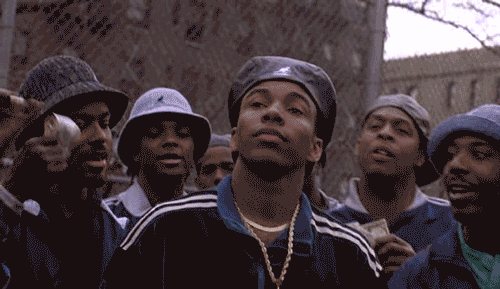On March 8th, 1991, 25 years ago today, the film New Jack City debuted nationwide, giving birth to two phenomenons that would live in perpetuity: the specter of Nino Brown and the sound of New Jack Swing.
Over the last quarter century, the movie has moved into cult-classic territory for a younger generation thanks in large part to Lil Waynes fixation on the housing complex that the fictional Cash Money Brothers commandeered, The Carter, and a story that resonates with those who came of age in the Reagan/Crack era.
Despite its many obvious flaws in character development and storyline, New Jack City is an important piece of work because its structural epicenter was not a figment of ones imagination, but firmly grounded in reality.
Yes, we could get bogged down, as the film does at times, in discussing its archetypal plot navigation and the forced and painful camaraderie of undercover cops Scotty Appleton and Nick Peretti, roles that were both played shakily, unevenly and sometimes painfully bad by both Ice-T and Judd Nelson.
And there was also the bizarre choice of the films stylist, who eschewed the popular, ubiquitous hi-top fade of the mid 80s as the main protagonists hairstyle in favor of making the ruthless and remorseless Nino Brown look more like the inverse of Bundini Brown, as if his barber rampaged on his head with a lawn mower.
Forget about the fact that the script would have you believe that Appleton and Peretti could topple an entire drug organization that had taken over the Harlem market while murdering its way through the Italian mafia, with a lovable crackhead named Pookie as its secret weapon. But that’s neither here nor there.
The film is loosely based on real-life Harlem drug lord Leroy “Nicky” Barnes, a man who was so revered and reviled in the 1970’s that he appeared on the cover of the New York Times Magazine and inspired a hit song by Jim Croce at the same time.
Nicky Barnes has been reconfigured in the form of Nino Brown and placed in the 1980’s in New Jack City, draped in dookie gold chains and tailored suits. We all know the story by now of Nino and G Money, who ride the Crack wave, gangland massacres and a ruthless business acumen to the top of the Harlem food chain.
The film maintains a place in our memories because of Wesley Snipes’ arresting portrayal of Brown and Chris Rock’s funny yet haunting work as Pookie, a role that catapulted him into the national consciousness as a talent that transcended humorous punch lines.
Produced with $8 million, it grossed over $47 million domestically, becoming the highest grossing independent film of 1991, a year in which Michael Jordan became bigger than the NBA and Magic Johnson made the world stand still when he announced that he’d contracted H.I.V.
I was in college when New Jack City came out and saw it in the theater on multiple occasions. Over the last 25 years, I’ve probably seen it close to 75 times. Despite its considerable warts, as a New York City kid, it continues to speak to me.
Who can ever forget G Money making the biggest light-skinned jump shot in basketball history, before Steph Curry put a dagger in the Oklahoma City Thunder?

My friends and I still spit some of the film’s memorable dialogue often. Among our favorites are:
“Money talks, and bullshit runs a marathon.”
“Sit yo’ five-dollar ass down, before I make change.”
“You gotta rob to get rich in the Reagan era.”
“If I was you, I’d be lookin’ for the pimples on the booty!”
“I had my jimmy waxed every day last week!”
“Yo baby, we talkin’ about combinatin’ and consolidatin’, that’s what’s up!”
“Yeah, yeah, yeah a mind is a terrible thing to waste. Now back to the titties.”
“I’m on the run, G. It can never go back the way it was.”
“Am I my brother’s keeper? Yes I am!”
“It just be callin’ me, man.”
And Nino’s soliloquy in the courtroom remains pertinent today, when he succinctly breaks down the war on drugs with his monologue on the witness stand: “I’m not guilty. You’re the one that’s guilty. The lawmakers, the politicians, the Columbian drug lords, all you who lobby against making drugs legal. Just like you did with alcohol during prohibition. You’re the one who’s guilty. I mean, c’mon, let’s kick the ballistics here: Ain’t no Uzi’s made in Harlem. Not one of us in here owns a poppy field. This thing is bigger than Nino Brown. This is big business. This is the American way.”
Snipes and Chris Rock, through the sheer power of their performances as characters on diametrical opposite sides of the ugly truth about the devil’s dandruff, save what could have been a forgettable movie. Their sincerity pulls the film out of the quicksand of its own chaotic attempt to be an inner city, wanna-be version of Scarface.
But if you were of a certain age in New York in the ’80s, New Jack City pulled off the trick of making you feel nostalgic about an ugly, terrifying era of baseheads, indiscriminate gunfire and the powerful force of addiction that destroyed families and claimed too many young and innocent lives.
A less celebrated triumph was the film’s soundtrack, which is still a destination to understand the musical feel of the early ’90s in New York City. As Nino Brown was an updated version of Nicky Barnes, For the Love of Money/Living for the City was a modern version of two 1970’s classics: Stevie Wonder’s “Living for the City” and the O’Jay’s “For the Love of Money.”
Color Me Badd’s “I Wanna Sex You Up” still conjures up images for me of riding across a jam-packed 125th Street during a sun-splashed Harlem Week. Ice-T’s “New Jack Hustler” never ceases to get the heart pumping and Christopher Williams’ “I’m Dreaming” still makes me scream, at the top of my lungs, “Girl I’m Dreamin’ ’bout you!!!”
The soundtrack sat in the top spot on Billboard’s “Top R&B Albums” chart for eight weeks, propelled by Teddy Riley’s New Jack Swing genre. Johnny Gill’s “I’m Still Waiting” is crazily slept on, and Keith Sweat’s “(There You Go) Tellin’ Me No Again” is a required case study for any dude trying to break out of the proverbial friend zone.
25 years later, we’re still jamming to the music, while pulling for G Money and Pookie to make it, and wishing that the Cash Money Brothers could have remained each other’s keeper.



